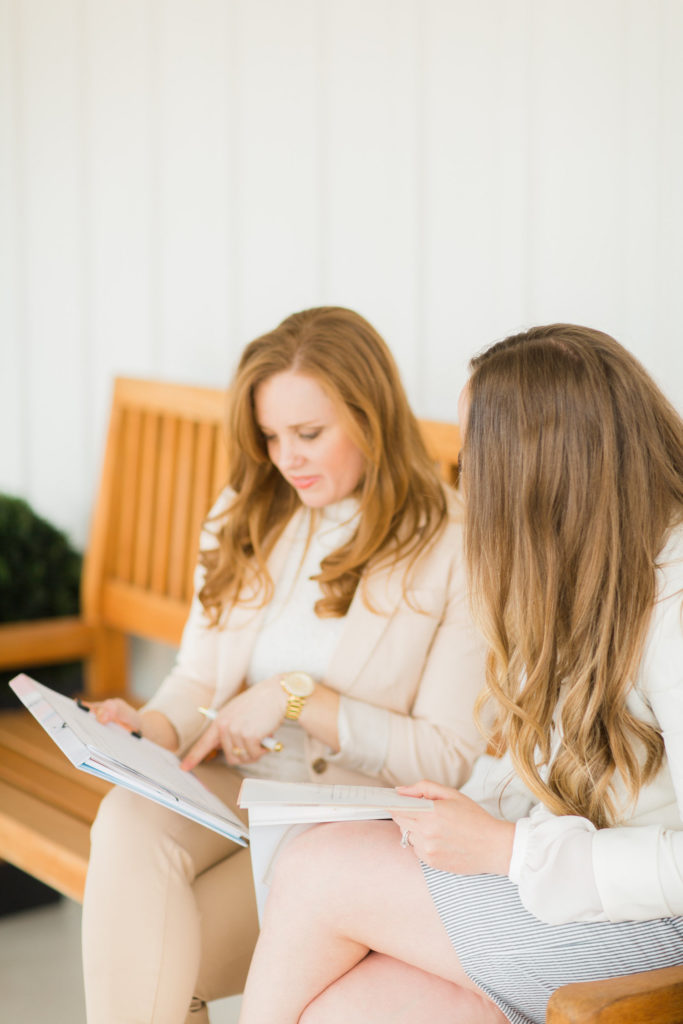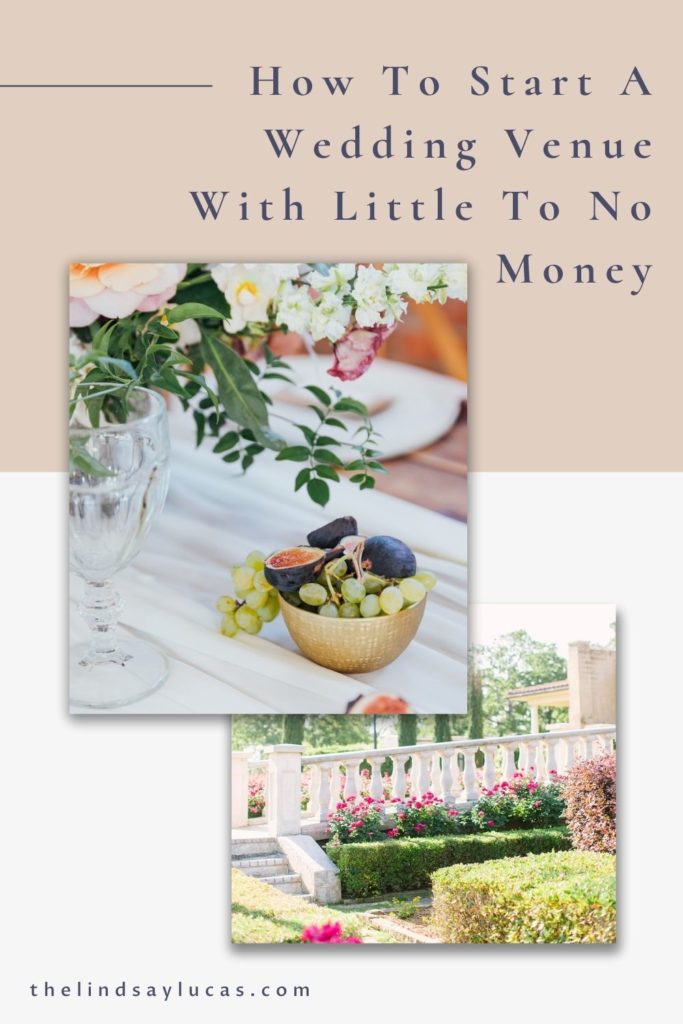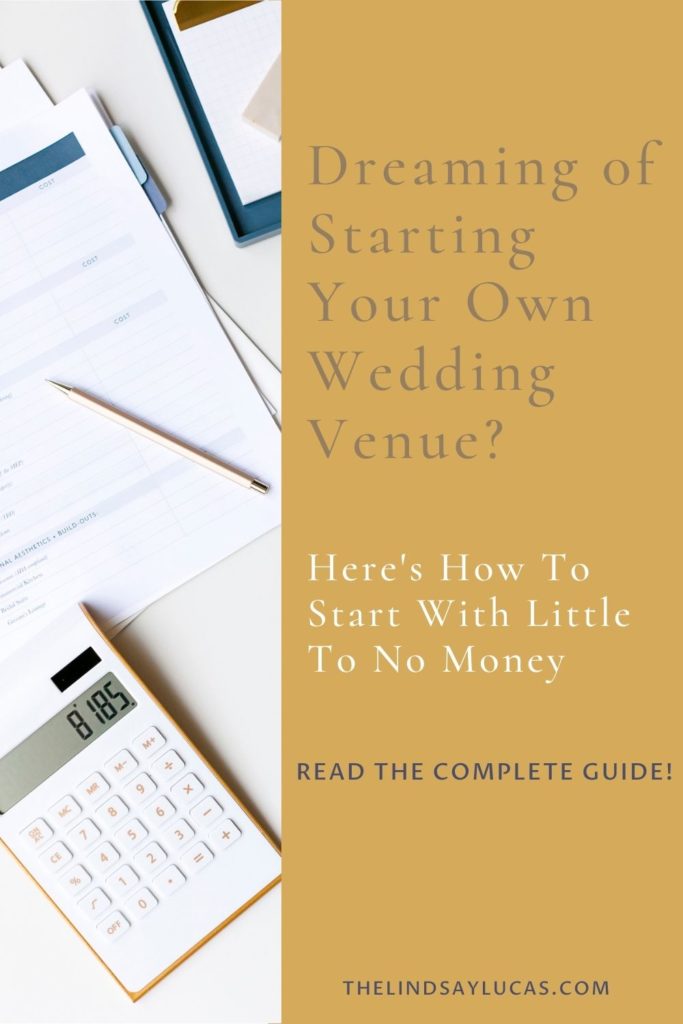Part II – How to Start a Wedding Venue With Little to No Money
Hey there, friends! In my last article, I talked about starting a wedding venue with little to no money, which is the number one question I get from people. I’m constantly asked, “How do I start? How do I get a loan? What if I don’t have any capital?” So many people feel lost when it comes to the subject of starting a wedding venue when you don’t have the money to do it.
This subject can be very overwhelming, and I want to equip you with everything I know, so I wrote a two-part article on the subject in order to not leave anything out. In part one, I dove into two of the five viable options on starting a wedding venue, and in this article, I’m going to get into the final three options.
If you haven’t read part one about starting a wedding venue, you’ll want to start there before diving into this one.
If you’ve read part one, and you’re ready for more, let’s get into the final three options on starting a wedding venue with little to no money!
Get a loan from a bank
This is an interesting one when you’re setting out to start a wedding venue because it isn’t necessarily viable if you don’t have any money. Basically, when you request a loan, most banks want to see that you have 20% down in savings. This shows that you have some skin in the game, and you’re not just asking them to front your dream to start a wedding venue.
I even tell my clients to plan for 25% just in case. I’ve had many clients who don’t have that kind of cash in their back pocket—don’t we all wish we did! My clients have had to get creative. For example, maybe you own the land that your venue is going to be built on, and you can use that as collateral. Check out my profit planner for a tool to help you figure out what kind of capital you need to kickstart your business.
Getting a bank loan can be tough
Real talk: If you don’t have 20%, you’re probably not going to get a bank loan to start a wedding venue
Essentially, there are other options to substitute the 20% down because, in all honesty, it’s hard to get a loan or even a meeting with a loan officer if you don’t have it. And when I say difficult I mean, it’s almost impossible.
Listen, I just want to be real with you. If you’re sitting around with $2000 and you’re wanting to start a wedding venue, it’s not going to happen. You probably won’t even get a meeting with a loan officer. It’s really important to understand the breadth of financial capital it takes to start a wedding venue.

I’m not saying this to discourage you, but I don’t want you to walk into a bank expecting them to loan you money, and then you’re left feeling discouraged when you find out they won’t.
This doesn’t mean that you can’t schedule a meeting with banks and say, “Look, I’m not where I need to be right now, but I need to know where I’m going. Can you help me start putting a plan into motion so that I can start a wedding venue?” This will also help you divert your effort to something that’s more viable, like getting a loan from a private investor or forming a partnership.
You need building capital AND operating capital to get a loan
The other thing I want to mention about loans from banks, which also matters when it comes to loans from private investors, is that you need to understand that with both, you’re going to need building capital and operating capital.
This is important to understand when you are determining how much money you’re going to need to start a wedding venue. You also need to understand that when you get these loans from an individual, you have to pay back that loan almost immediately.
Banks and investors refer to building capital as CAPEX. This is your capital expenditure (how much money you’re going to need to build and renovate). They’re usually one-time chunks of money that they’re giving you.
The operating capital is called OPEX (operating expenditures). These are your monthly expenses like your electricity, your internet, and cable that need to be accounted for when you start a wedding venue.
Getting loans from private investors
This is another viable option when you decide to start a wedding venue with little to no money. These are loans from anybody who is not a bank. For example, angel investors or a holding company that invests in commercial real estate.
The payback percentage and terms of these loans depend on your investor. Private investors “could be” more flexible than a loan from a bank, especially if it’s a private individual.
Maybe there are people who want to invest in women-owned businesses and they want to give you a 6-month grace period on your payback process. Maybe a private investor just wants a 10-15% return on their money beginning in year two.
These are just examples, and it’s not something I can predict for you. You have to understand what your investor wants and, of course, this should be in writing on paper.
I would say, if you’re looking for something with flexible terms to start a wedding venue, I would try to find some private investors who do this as a hobby and want to invest in the 7-billion-dollar wedding industry.
How do you find private investors to start a wedding venue?
Many people, when they hear the word “investor,” have a certain corporate picture that pops into their minds. And yes, you can go to different corporations to start a wedding venue, and there are those companies that are specifically made for that, but it’s not your only option.
There are other ways to seek investors to start a wedding venue. I’m going to go back to point number two from part one in this series, where I talked about owner finance options. It’s all about being savvy, keeping your ear to the ground, working your network, and feeling out who has invested in other commercial spaces in your area.
These people might not even be the right investors for you, but you don’t know who their friends are! See if you can set up a 15-minute meeting with them to ask them what they’ve done and tell them what you’re doing and why you want to start a wedding venue. Who knows. They might have a friend who is really interested in investing in private commercial spaces and is intrigued by the wedding industry.
For more knowledge and expertise on finding investors, I’ve poured everything I know into my course ‘Funding 101’—make sure you check it out!
Seeking out other venues to be a private investor
Another possible viable option when you decide to start a wedding venue is other venues. A couple of my clients who have done really well have been approached by venues, not within their local market, but by people outside of their state who have had trouble finding investors. They are asking, “What did you do? Can you give us any pointers?” These types of potential investors don’t want to be responsible for another venue (the operations, the day-to-day work), but they are interested in the investment side of it.
When you go to start a wedding venue and are seeking a private investor, try going to other venues outside your local market. If you go to a local competitor, the answer is going to be a hard and fast no. But, go outside of your local market to someone who is crushing it—their product is amazing, they’re fully booked, and their client experience is amazing.
This is a great option when you start a wedding venue because if they’re investing in you, they want to make sure that you’re succeeding because they want to have a return on their investment.
Find a partner or multiple partners
A lot of people have gathered friends, families, or other vendors who are interested in creating a space for couples in their area. These could be silent partners who just want to land their money somewhere.
You can show them your business plan and why you want to start a wedding venue. If they believe in what you’re doing, they might want to invest in you financially, but they’re not trying to run the day-to-day aspects of your business.

Being in a partnership isn’t always an easy thing to do. It’s challenging, even in the best of circumstances because we’re human, and running a business can create anxiety. When people feel anxious and there are stressors involved, it can bring out the best and the worst in people.
Even if you’re partnering with a family member to start a wedding venue, it’s extremely important that things are in writing, everyone’s put their signature on the paperwork, and each person understands their role.
Of course, things will naturally progress and your roles within the business might change as you understand more about running a venue. But in order for it to run like a business and be professional, you have to take it seriously and have professional contracts in place.
When it comes to partnerships, get creative!
I live in the Houston area, and I know of several vendors who all needed office space but didn’t want to rent their own office. So they got creative and together found a gorgeous home in the area. They decided to all go into the lease together, each individually renting out bedrooms for their offices.
And then, they accidentally started getting inquiries from other vendors who wanted to rent out their space, and it turned into a mini venue for smaller events! It was incredibly fruitful and brilliantly creative. Even though some of it happened accidentally, I think it’s a great idea for a potential option out there.
You might be thinking that you need a brand new venue in your area to start a wedding venue, but there are other creative options out there that you might find you like better. You could also find out that starting in a smaller or different way than you anticipated will give you that experience you’re looking for. Then you can go and fulfill that dream and start a wedding venue that’s larger and closer to your dream in 3-5 years!
That’s it! This wraps up my two-part series on starting a wedding venue with little to no money! It’s quite a bit to take in—I understand that, so if you ever have any questions on how to start a venue, I’d love to hear from you!
DID YOU ENJOY THIS ARTICLE POST? PIN IT FOR LATER…


Affiliate Disclosure
& Content Disclaimer
This post may contain affiliate links from a paid sponsor, Amazon or other program. When you use these links to make a purchase I earn a small commission at no extra cost to you. This allows me to continue creating the content that you love. The content in this article is created for information only and based on my research and/or opinion.
Affiliate Disclosure
& Content Disclaimer
This post may contain affiliate links from a paid sponsor, Amazon or other program. When you use these links to make a purchase I earn a small commission at no extra cost to you. This allows me to continue creating the content that you love. The content in this article is created for information only and based on my research and/or opinion.